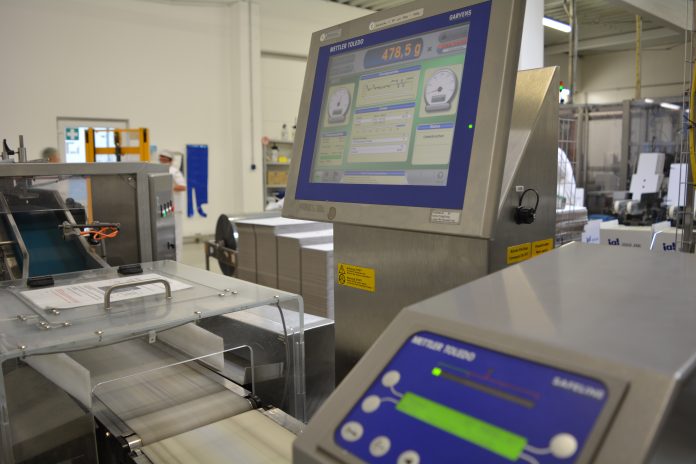
Data plays a crucial role in shaping the world and fostering societal growth, learning, and development. In food manufacturing, data is the driving force behind optimal processes and results. This holds particularly true for product inspection, where the impact of data ripples through various operational and commercial facets. One company that exemplifies this connection between data and efficiency is Heinrichsthaler, a German cheese manufacturer.
Picture this: Heinrichsthaler churns out a staggering 200 tons of dairy products daily across 12 production lines. At critical checkpoints, five combination checkweigher/metal detection systems diligently inspect the output, scrutinizing a whopping 7,000 products per hour. The real magic, however, happens in the meticulous optimization of these product inspection facilities, leading to a remarkable reduction in product giveaways from 3% to an impressive 0.9%.
What lies at the core of this success? The answer lies in the goldmine of production line data collected by the combination product inspection system’s data management software. This real-time treasure trove not only identifies errors and inefficiencies but also corrects them on the fly. According to Gründinger, the production director at Heinrichsthaler, “Real-time proactive data preparation helps us to avoid costly overfilling. Our investment in the inspection management equipment has already paid for itself within three months.”
The data management software doesn’t just stop at real-time corrections; it provides a holistic view of the inspection equipment’s status, adding a layer of transparency to the production process. This transparency enables the timely implementation of production flow control measures, enhancing the production line’s overall availability. Trend analysis becomes a valuable tool in detecting anomalies, such as weight discrepancies, while metal detection systems undergo rigorous testing every 90 minutes, supporting compliance with defined specifications.
Test results are continuously documented in the data management software, helping Heinrichsthaler to check that inspection systems are working according to defined specifications. The data management software is also allowing the company to quickly and easily prepare reports for submission to auditors, such as the weights and measures authorities and the IFS certification office.
Putting data first
With a data management system in place, food manufacturers can take major steps towards combating operational costs and becoming more efficient by making the management of product inspection data central to the way they organise manufacturing. Essentially, by putting data first.
Indeed, data management is the gateway to the digitalized future of food manufacturing, leading to true supply chain transparency. There are stages that manufacturers can work through to reach this aspirational level, however, and often this begins with the realization that the business needs to move from labor-intensive manual record-keeping to automated collection and storage of records.
While this is a big culture change for some manufacturing plants, it is a key part of the process. Real-time data, automatically collected, gives manufacturers true, actionable information, providing insights on which to base manufacturing decisions that improve efficiency and boost productivity.
A critical component of data management is the ability to share collected data easily, and this is where connectivity comes in. Today, food manufacturers can invest in product inspection devices that have built-in machine-to-machine communication protocols, enabling secure transmission of data on an individual machine or device level, up through production line and site systems to enterprise and cloud-based systems. Such connectivity unlocks a wealth of benefits and further possibilities, both within the manufacturing environment, where potential production issues can be averted through preventive action, and within a manufacturer’s supply chain network.
Moving towards digitalization
Modernization is also happening along the food supply chain, and the increasing drive towards digitalization by food manufacturers is founded on sophisticated data management. In the not-too-distant future, the entire food supply chain is going to have to embrace digitalized food safety processes to comply with evolving regulatory requirements. The industry is heading towards food safety digital maturity – a point at which systems and processes can capture and record performance and production line data automatically, both for real-time production line improvements and to make this information seamlessly available to necessary supply chain partners.
As technology becomes more sophisticated, companies will need to think beyond data management software to also factor in essential building blocks for the digitalized supply chain, such as cloud storage, Blockchain and systems integration.
The relationship between investing in such digital infrastructure and the drive towards combating costs might seem slightly more distant than some of the other aspects of data management that we have already discussed. However, the real impact lies in the fundamental operational efficiency, productivity, and reputational integrity of the entire food manufacturing business, which makes it both a cost saver and a revenue driver.
The benefits of digital maturity can be profound, for example, if a product recall needs to be actioned, it can be targeted to the exact products affected, instead of larger batches that might include perfectly good products. Food manufacturers will enjoy closer and far more positive relationships with their supply chain partners too, which could be a huge cost saving compared to taking no steps at all towards digitalisation and supply chain transparency.

In essence, just as information and data propel society forward, data management has the potential to revolutionize the efficiency of day-to-day operations for food manufacturers. It extends its influence to the highest levels of company and brand strategy, making a significant impact on business performance. The result is a reduction in costs, a drive for growth, and the ultimate future-proofing of production lines in the most modern and effective way possible.
IndiFoodBev — authentic, impactful and influential
An English-language food and beverage processing and packaging industry B2B platform in print and web, IndiFoodBev is in its third year of publication. It is said that the Indian food and beverage industries represent approximately US$ 900 billion in revenues which implies more than 20% of the country’s GDP. Eliminating the wastage on the farmside can help to deliver more protein to a higher number of the population apart from generating sizable exports. The savings in soil, seeds, water, fertilizer, energy and ultimately food and nutrition could be the most immense contribution that country is poised to make to the moderation of climate change.
To improve your marketing and grow sales to the food and beverage processing and packaging industry, talk to us. Our research and consulting company IppStar [www.ippstar.org] can assess your potential and addressable markets in light of the competition. We can discuss marketing, communication, and sales strategies for market entry and growth.
Suppliers and service providers with a strategy and budget for targeted marketing can discuss using our hybrid print, web, video, and social media channels to create brand recognition linked to market relevance. Our technical writers are ready to meet you and your customers for content.
The second largest producer of fruit and vegetables in the world is continuously expanding processing capacities and delivery systems with appropriate innovative technologies. We cover product and consumer trends, nutrition, processing, research, equipment and packaging from farm to thali. Get our 2025 media kit and recalibrate your role in this dynamic market. Enhance your visibility and relevance to existing markets and turn potential customers into conversations. Ask for a sample copy of our bi-monthly in print or our weekly IndiFoodBev eZine each Wednesday.
For editorial info@ippgroup.in — for advertisement ads1@ippgroup.in and for subscriptions subscription@ippgroup.in
Naresh Khanna – 10 February 2025
Subscribe Now










